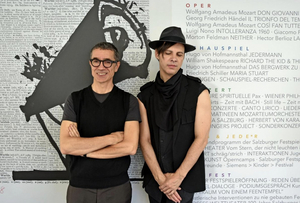VIDEO: Watch The Salzburg Festivals Terrace Talk On DON GIOVANNI
The production runs from July 26th through August 20th.

Love is the greatest value in Don Giovanni's life. To conductor Teodor Currentzis, the fact that he is willing to betray, rape, even kill for this love constitutes the complexity of the figure, the myth of Don Giovanni. "In this opera, Mozart asks questions without giving answers," says Teodor Currentzis, who conducts the new production at the Salzburg Festival. "Are the values we categorize as good and evil honest? For me, this is where the biblical element comes in - good people go to heaven, bad ones to hell." Despite all this, Don Giovanni does not even have the most beautiful arias, in his opinion - those are reserved for Don Ottavio, who might be considered Don Giovanni's mirror image.
There have been 217 performances of Don Giovanni in the Salzburg Festival's history, the first of them entitled Don Juan, sung in German in 1922. This summer's production is directed by Romeo Castellucci, who won several awards for his production of Salome at the 2018 Salzburg Festival. He considers it a great honour now to have been invited to direct a Mozart opera in the city of Mozart. "I would like to create an atmosphere of beauty," says the director. "Teodor and I have the same artistic vision; we have identical ideas about the mission of art," he adds, explaining that it is his goal to reflect in his staging whatever the conductor brings to light in the music. The manner in which Teodor Currentzis interprets the music immediately revealed a
burning passion to him, one that he too wants to see on stage. "This Don Giovanni will be alive
and contemporary," he promises.
In a subtle way, death is omnipresent in Mozart's music, he goes on - even in the cheerful passages. "In this opera, the figure of Don Giovanni is racing towards death. He wishes for dissolution, for death, but he wants all that while he is alive, and he celebrates life as he goes along," says Romeo Castellucci. "For Don Giovanni, damnation is redemption." Only his own destruction creates his character and his myth. "It is a paradox and creative system," the director says. Teodor Currentzis explains that he considers Don Giovanni the most difficult of the Da Ponte operas. It is difficult to stage. Romeo Castellucci, however, is exactly on his wavelength, for which he is grateful to Artistic Director Markus Hinterhäuser. "I value the way in which Romeo sees details other people miss. He has an incredibly intuition that makes him examine these very details, while sticking very closely to Mozart's own dramaturgy," says Teodor Currentzis.
Thus, Romeo Castellucci will have 150 women from Salzburg on stage as supernumeraries. While Leporello sings of women as mere numbers in his "catalogue aria", treating them like objects which are distinguished if at all, then merely by attributes such as the colour of their hair, the director puts these women on stage, giving them a face and a story. "It is a fantastic, concrete connection with the city; I am delighted that we have found 150 women from Salzburg to participate," he says. Don Giovanni, the perfect symbol of loneliness, meets all these women embodying his desire. "He destroys, he divides, there is disorder," Romeo Castellucci says. Don Giovanni embodies whatever we lack the courage to dare, says Teodor Currentzis. He recognizes three female types in the opera: the mother, the lover and the sorceress. For him - this much Teodor Currentzis revealed at the end of the Terrace Talk - this production has been possible only in Salzburg and only during the Salzburg Festival's centenary. The production is a homage to the Festival, and he regrets that there are only six performances.
Photo: Press Office of the Salzburg Festival/Anne Zeuner
Comments
Videos

